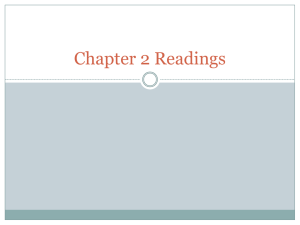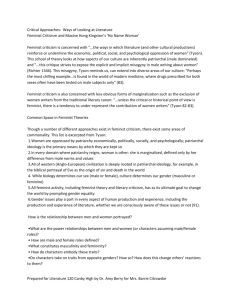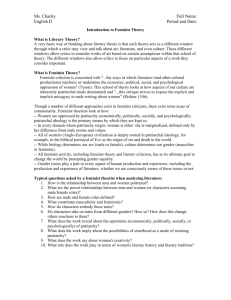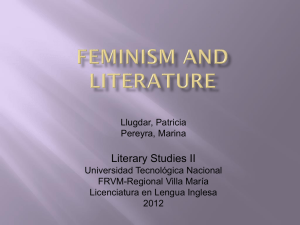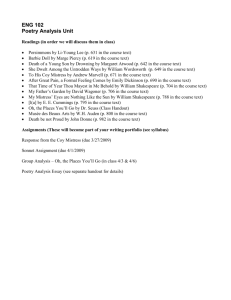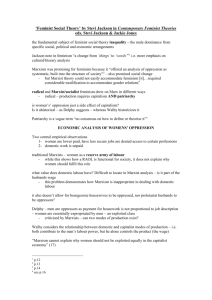Feminist Essay Sample.doc
advertisement
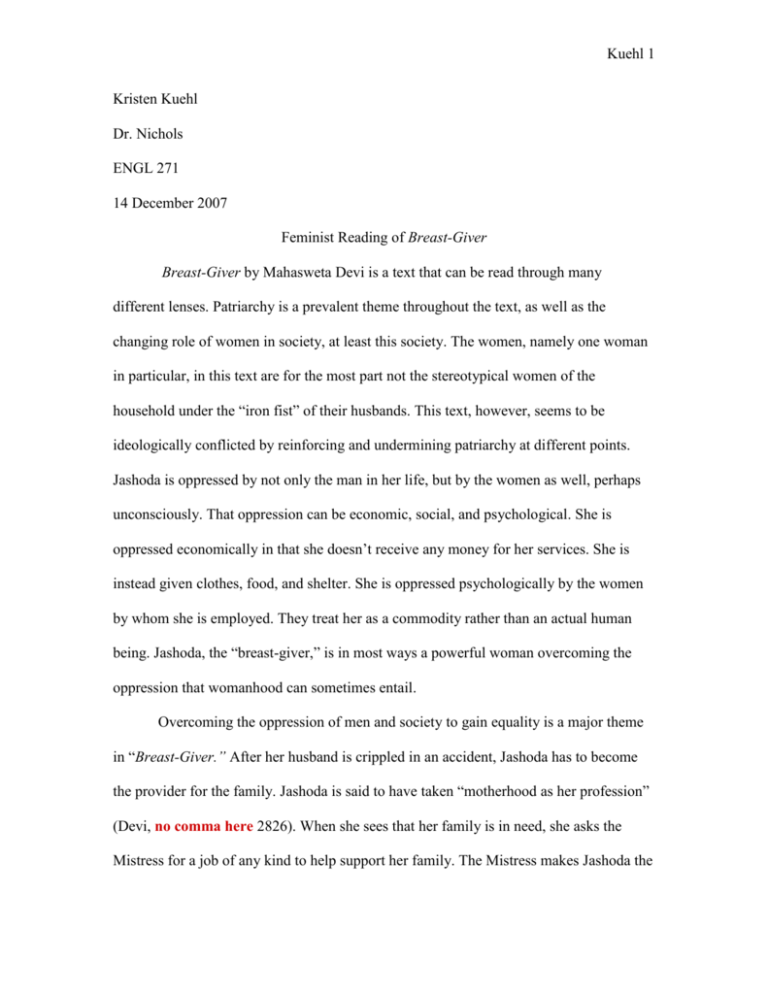
Kuehl 1 Kristen Kuehl Dr. Nichols ENGL 271 14 December 2007 Feminist Reading of Breast-Giver Breast-Giver by Mahasweta Devi is a text that can be read through many different lenses. Patriarchy is a prevalent theme throughout the text, as well as the changing role of women in society, at least this society. The women, namely one woman in particular, in this text are for the most part not the stereotypical women of the household under the “iron fist” of their husbands. This text, however, seems to be ideologically conflicted by reinforcing and undermining patriarchy at different points. Jashoda is oppressed by not only the man in her life, but by the women as well, perhaps unconsciously. That oppression can be economic, social, and psychological. She is oppressed economically in that she doesn’t receive any money for her services. She is instead given clothes, food, and shelter. She is oppressed psychologically by the women by whom she is employed. They treat her as a commodity rather than an actual human being. Jashoda, the “breast-giver,” is in most ways a powerful woman overcoming the oppression that womanhood can sometimes entail. Overcoming the oppression of men and society to gain equality is a major theme in “Breast-Giver.” After her husband is crippled in an accident, Jashoda has to become the provider for the family. Jashoda is said to have taken “motherhood as her profession” (Devi, no comma here 2826). When she sees that her family is in need, she asks the Mistress for a job of any kind to help support her family. The Mistress makes Jashoda the Kuehl 2 wet nurse for her family. Jashoda becomes the sole wage-earner in her family, making her an empowered woman not dependent on her husband. She uses her ingenuity and comes up with a way to support her family instead of just becoming the passive wife of a crippled man and doing nothing to help herself or her children. Using her own body, she does her work outside of her own home with only her own family’s well-being in mind, as some modern-day women do. Though she is the provider for the family, Jashoda is not free from her responsibilities as a wife and mother to her own children. She has to do both jobs simultaneously, which speaks to the complexities of many women’s lives. Just because a woman works outside the home to earn a living doesn’t mean that she cares any less about the goings on in her household and family. A working woman needs to continue to be strong for her family even though she may not be present some of the time and it is known that women can be both nurturing and powerful at the same time. Jashoda also has to overcome the oppression of a predominately patriarchal society, which is an important ideal in feminist theory. According to Tyson, give full name of source on first mention in every area where patriarchy is in control, “woman is other: she is objectified and marginalized, defined only by her difference from male norms and values, defined by what she (allegedly) lacks and that men (allegedly) have” (Tyson, 92). Jashoda overcomes being “other” in many different ways. The society in which Jashoda lives holds men in a higher regard than women. The men are the providers for the family, as well as the heads of the household. Jashoda reverses these traditional patriarchal norms. She becomes a leader and she goes to work outside the home to provide food for her family. In this way, she becomes equal to or greater than her husband and the other men of society. She takes on responsibilities that are usually left Kuehl 3 for the man of the house to fulfill. Jashoda and Kangalicharan switch stereotypical “roles” of men and women. Kangalicharan “took charge of the cooking at home” (Devi, 2834) while Jashoda went to work. This reversal of traditional roles speaks to Jashoda’s initiative as well as her power within the family and society. She and her husband become equals in regards to the work done at home that is traditionally the work of the woman. Although one can read this text through a feminist view, there are instances that seem to contradict that point-of-view. ambiguous sentence Even after overcoming the oppression of men in her life, Jashoda fell under the oppression of another group of people: the women whose children she gave her milk to. The very fact that she is hired by them subjects her to their will and command. The women in the household treat Jashoda as a commodity rather than a living human being. To them, she is just someone who gives milk to their children in exchange for food. The fact that she is paid for her services in clothes and food rather than actual cash money just furthers the oppression that she is under. She and her family are completely dependent on Haldar’s women for their life and livelihood. They seem indifferent to her as a person and anything she has to offer besides her milk. This becomes clear when the Mistress dies. Even after all the children were weaned and Jashoda’s milk was no longer needed, Mistress continued to send food to Jashoda’s family. But when the Mistress dies, the daughters-in-law stop giving that food and Jashoda is left to find another way to provide for her family. As would be expected, Jashoda doesn’t know what to do to provide for her family because breast-feeding babies is they only thing she has known for thirty years. The women have complete control over her life and livelihood. When the women have no need for Jashoda anymore, they get rid Kuehl 4 of her and leave her to fend for herself without a thought for her well-being or the survival of her family. The fact that the women that employ Jashoda are in fact playing a role in oppressing her contradicts the feminist notion of “sisterhood as a mode of resisting patriarchy” (Tyson, 119). The women are basically taking the place of a man or a husband and continuing the oppression that Jashoda may have felt in her home. The women see Jashoda as someone who is not their equal and is performing a service and nothing else and they exploit that service to a point where Jashoda ultimately pays with her life. The women discard her as soon as they have no use for her services any longer, like a machine that is broken beyond repair. The women, instead of joining together with Jashoda, turn against her and ultimately support the patriarchal society in which they live. Although she is the sole provider for her family, the fact that Jashoda is a woman plays a monumental role. To earn a living, Jashoda can only use what she has as a woman: her breasts and milk. The Mistress praises Jashoda about the amount of milk she produces and Jashoda comments that that there was “a flood of milk” although she was between pregnancies and she didn’t have any special food or pampering (Devi, 2832). When the Mistress gives Jashoda the job, Jashoda goes home that night and says to her husband, “Look. I’m going to pull our weight with these” (Devi, 2833). She obviously takes great pride in her body and what she is able to do with it, but the fact that her job is a sexist one cannot be overlooked. It is obvious that only a woman can do a job such as the one Jashoda does. Women are again objectified and subjected to the view of only being good for certain things that men cannot do. In this way, you could say that the work is “gendered” and the text is supporting traditional gender roles. Jashoda is, in a way, the Kuehl 5 stereotypical woman, raising children (though some are not her own) and keeping a home for her husband. She is seen as submissive and nurturing in a way that traditional gender roles support. Women are seen as “emotional (irrational), weak, nurturing, and submissive”, while men are portrayed as “rational, strong, protective, and decisive” (Tyson, 85). The belief that men are superior to women is also evident in the text. The only reason Jashoda goes to work outside the home in the first place is because her husband is injured and cannot work and provide for their family any longer. Before her husband’s accident, Jashoda was in the home, raising children, and was stuck in a traditionally female role of housewife. She had no other use to him besides bearing and raising children and keeping a home for him and their family. The traditional roles are switched, however, when Jashoda goes to work as a wet nurse. The argument that Breast-Giver can be read as a feminist text is a strong one. The text portrays Jashoda as a strong, empowered woman who has overcome obstacles and oppression in her life to do something important for others as well as her own family. While the text portrays some patriarchal views of the roles of women, Jashoda plays an important part in reversing the readers’ views on women and their contributions to society. Being a woman in a patriarchal society can present challenges, but Jashoda takes them in stride and makes something of herself without being dependent on men or others to provide for her. Kuehl 6 Works Cited Devi, Mahasweta. “Breast-Giver.” The Norton Anthology of World Literature. Ed. Sarah Lawall. 2nd ed. Vol. F. New York: W.W. Norton & Co, 2002. 2824- 2845. Tyson, Lois. “Feminist Criticism.” Critical Theory Today: A User Friendly Guide. 2nd ed. New York: Routledge Publishing, 2006. 83-133 Kristen: this is really excellent work. A pleasure to read. +39 A+ Semester grade = A

